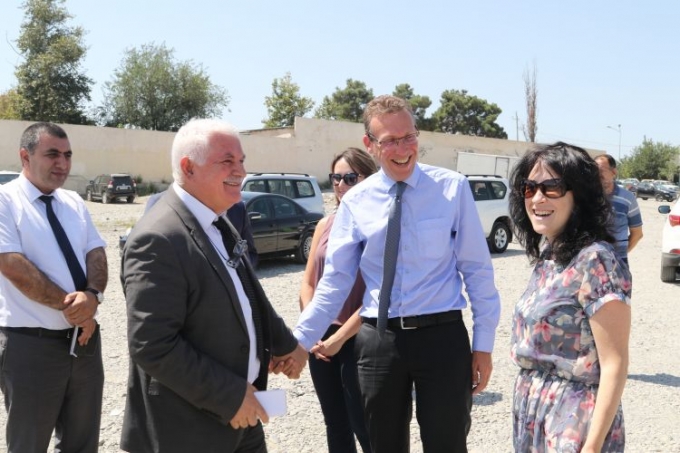August 22-23, on the invitation of the International Euraisa Press Fund (IEPF), representatives from the Delegation of the European Union to Azerbaijan, the Head of Cooperation Jeroen Willems and Project Manager Ramila Aslanova visited Tartar and Barda regions within the "Assistance program for the development of the regions and rural areas" aimed to support the comprehensive development and diversification of the economy by reducing the economic differences among the regions.
Receiving the guests, the head of the Executive Power of the Tartar region Mustaqim Mammadov informed them about the socio-economic programs implemented in Tartar region, closer to the line of contact. Mr. Mammadov highly appreciated the socio-humanitarian acitivies carried out by the IEPF in Tartar. Mustaqim Mammadov stated that the cotton-growing, silkworm breeding and fruit and vegetable production significantly developed after the last order of the President of Azerbaijan. Representative of the Executive Power also gave an information about the emerging problems in irrigation of planting areas, due to the closure of Tartar River, contamination of the river with the explosive substances, and the possibility of taking advantages of the water only by 30%.
The guests said that all mentioned is unacceptable and it is important to use all opportunities of the water reservoirs and artesian wells drilled in the villages. Being impressed by the activities of the IEPF for development of the socio-humanitarian sector in the IEPF Vocational Training Center in Tartar, Jeroen Willems highly appreciated the work for the development of socio-economic infrastructure done by the government jointly with the representatives of the civil society in the war-affected areas. He also underlined that EU is ready to support the implementation of the programs in the regions.
Then they visited the Shikharkh, Hasangaya, and Gapanly villages that are close to the occupied territory. They saw the ruins of the war, destroyed infrastructure and the restoration of the monument ‘Maraga 150’, which was built by armenians in 1978 for the 150th anniversary of their movement to Karabagh.
IEPF President Umud Mirzayev talked about the restoration of the socio-economic infrastructure and the projects in the war-affected areas implemented by the IEPF. Representatives from the Delegation of the European Union to Azerbaijan also got acquianted with the demining process in the frontline regions and newly building residential areas for the IDPs. They said that all that have already been done are the essential issues for the stability and peace. Then after they visited strawberry plantations in Irevanli village and discussed the opportunities of future collaboration in this field.
Representatives from the EU Delegation to Azerbaijan together with the IEPF President Umud Mirzayev went to Barda and met with the head of the Executive Power of Barda region, Vidadi Isayev. During the meeting Mr. Isayev informed the guests about Barda which was the capital city of Azerbaijan for 500 years, and its agricultural opportunities. He also stressed that Barda is the region where the most of IDPs are settled. In addition, he highly appreciated joint cooperation with the EU in social and economic spheres.
The IEPF President Umud Mirzayev emphasized Mr. Isayev’s initiatives regarding the development of joint collaboration between government and civil society. He talked about the importance of the infrastructural projects implemented in Barda.
Then representatives from the EU Delegation gave an information about the pilot project of the EU for the development of the entrepreneurship and cooperatives in Aran region.
The guests also visited the Agro-Park, several farms and greenhouses in Barda. After the visit to historical “Nushaba castle” and the place where there are the settlements of IDPs, the guests talked about the tourism potential of the region. They pointed out the importance of collaboration in increasing of employment rate and rural tourism development in the region.
At the end Jeroen Willems and Ramila Aslanova said that this kind of trips to the regions play more important role in terms of the formation of joint projects and receiving the productive results.


